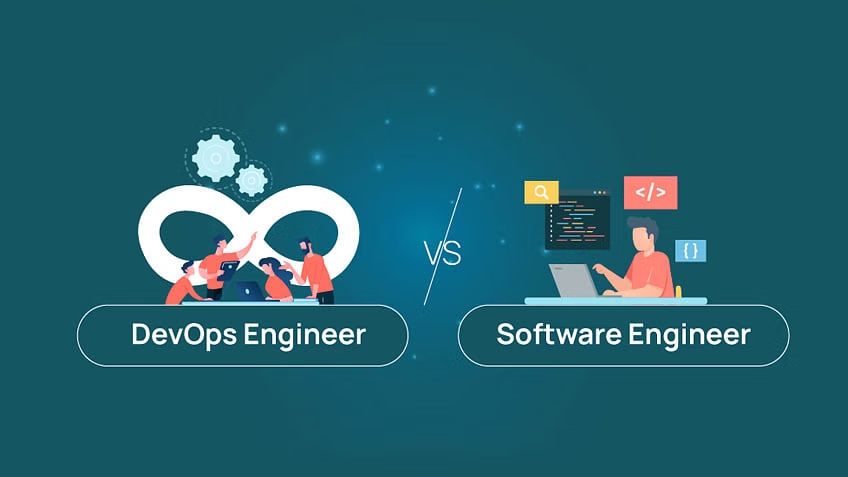Two of the most pivotal roles in software development are that of a software engineer and a DevOps engineer. They are both among the most in-demand jobs in IT. While software engineering is more of a broader term, DevOps is a specialty.
The discussion around DevOps engineer vs. software engineer roles is highly pertinent for those trying to build a career in this field. Often, the line between both roles seems blurry, and it’s easy to confuse with one another. While they do have some overlaps, some differences make them distinct from each other.
If you’re trying to choose between these two roles, we encourage you to read this guide to learn more about them, what sets them apart, and what makes them similar. Besides the DevOps engineer vs. software engineer debate, it’s also worth knowing about a DevOps program if you’re more inclined to go down the DevOps route.
Who is a Software Engineer?
Software engineers design, develop, test, and maintain software applications. They have a varied skill set, which includes various programming languages. A software engineer is at the center of the buzz in crafting solutions that harmonize performance, security, and usability.
Let’s dive into the key responsibilities, day-to-day tasks, who they collaborate with, and their career progression.
Also Read: DevOps Metrics: Measuring DevOps Success
Roles and Responsibilities of a Software Engineer
As a Software Engineer, some of the roles and responsibilities you will have are as follows:
- Conceptualizing and implementing cutting-edge real-time optimization algorithms that are custom-made for autonomous systems
- Leading the charge in driving the development process, focusing on enhancing existing solvers for continual improvement
- Ensuring that all products meet rigorous standards by engineering for scalability, security, and reliability
- Designing and developing runtime performance-critical code to optimize software execution
- Undertaking deep dives into existing software to identify and debug critical functionality issues
- Locating performance hotspots and implementing strategies to enhance overall code performance
- Crafting robust, execution-time critical software and planning for autonomous systems
- Active participation in an Agile development environment, ensuring flexibility and efficiency throughout the software development lifecycle
- Effective team collaboration, working seamlessly with diverse professionals to achieve project objectives
- Application of model-predictive control algorithms, integrating advanced control systems into software solutions
- Handling the entire software development lifecycle, including planning, coding, testing, and release
- Expertise in handling embedded software development, contributing to the functionality of diverse software applications
Day-to-Day Tasks of a Software Engineer
A software engineer has to be part of a larger development team where they have to collaborate with diverse team members. Let us look at what a regular day looks like in the life of a software engineer.
- A software engineer has to engage with a diverse array of programming languages. These include Java, C++, Python, and JavaScript. These tools are used to create different software applications for desktops, mobile devices, and the web.
- Apply their understanding of software engineering principles, algorithms, and data structures to design and develop software solutions. They must ensure functionality and optimization for performance, security, and usability.
- Implement agile methodologies in day-to-day tasks. This includes steering the software development process through planning, coding, testing, and the release of software products. The agile framework is the keystone to enhancing the adaptability and efficiency of the project at hand.
- Undertake the responsibility of regularly maintaining and updating existing software applications. This ensures that software remains current, functional, and aligned with the goals.
- Contribute meaningfully within collaborative teams. The software engineer will have to assume roles such as front-end, back-end, or full-stack developer. This is essential for successful software development projects.
- Effective communication is another responsibility as they need to establish the dynamics between team members, stakeholders, and end-users. This communication helps in fostering successful project outcomes.
Who Do Software Engineers Collaborate With?
A software engineer is a member of a team that has members with different specializations. Building digital products is no mean feat; you will meet many skilled professionals.
As a software engineer, you must collaborate seamlessly with designers, product managers, and quality assurance teams. The aim is to ensure that software products align precisely with the project requirements. Overall, your collaboration helps foster a holistic and integrated development approach.
Also Read: A Comprehensive List of Top DevOps Tools for 2024
Career Progression of Software Engineers
Within a software engineer’s career trajectory, you can find many pathways. However, some of the most prominent and promising roles are:
Applications Engineers
They are in charge of deciphering user needs and approaching product development projects with the developer and the user in mind. They can find opportunities in tech companies, finance and banking, IT companies, etc.
Systems Engineers
Systems engineers are part of creating and sustaining the evolution of computer systems while overseeing broader IT operations. They have a broader perspective that considers the growth and functionality of organizational computing infrastructure.
Regarding career progression, software engineers can aspire to higher roles, such as software architects or project managers. These roles represent advanced stages in a software engineer’s career.
Who is a DevOps Engineer?
A DevOps Engineer is a relatively new term, but an integral part of any development environment today. In broad terms, they are an IT specialist tasked with crafting and overseeing systems that enable agile software development and deployment.
Their role involves bringing together the efforts of software development and operations teams, hence the name Dev and Ops. This approach optimizes the software delivery pipeline for speed and dependable deliverables.
Let us take an in-depth look at the roles and responsibilities of a DevOps engineer.
Roles and Responsibilities of a DevOps Engineer
- Collaborating with partners, client technical leads, and executive stakeholders, they then orchestrate and execute the implementation of DevOps solutions
- Partnering with product and engineering teams to implement best practices, they make leadership guidance available and publicly available assets
- Engaging with partners and technical stakeholders to navigate project parameters, they ensure the alignment of scope, deliverables, priorities, and timelines.
- Championing customer needs and addressing adoption obstacles. They also leverage field experience to spearhead the development of new features.
- Presenting solution architectures and overseeing the deployment of distributed virtualized infrastructure solutions. These solutions are tailored to meet customer requirements.
The Day-to-Day Tasks of a DevOps Engineer
As a relatively recent development in the tech world, you will find the role of DevOps quite interesting. It encompasses a spectrum of tasks that include both integration of development and operations. Here’s an insight into the typical day-to-day activities.
- Serving as the link between development and operations teams. They foster collaboration to streamline the software delivery process.
- Leveraging their expertise to design and implement automation tools such as Puppet, Chef, and Ansible. It enhances efficiency and ensures reliability in the development and deployment pipeline.
- Ensuring applications are developed and deployed consistently and in a repeatable manner.
- Monitoring system performance and promptly addressing issues as they arise, Overall, this practice contributes to the continuous optimization of operations.
- Collaborating with fellow IT professionals to uphold application security and scalability. They also make sure it aligns with the overarching organizational objectives.
- Demonstrating a deep understanding of both software development principles and IT operations.
- Applying scripting and automation skills effectively, utilizing tools like Puppet, Chef, and Ansible to create robust and efficient systems
- Utilizing expertise in cloud platforms such as AWS, Azure, and Google Cloud to create scalable and resilient infrastructures.
- DevOps Engineers stay abreast of the latest industry trends and technologies by adopting continuous learning methods.
As dedicated team players, they contribute to delivering high-quality software, actively participating in initiatives to improve organizational efficiency. It is a role seeped in collaboration, automation, consistency, and staying ahead of a dynamic landscape.
Career Progression of DevOps Engineers
As a developing area, you are likely to find exciting roles that bring together unique combinations of skills. Here are some of the most popular pathways for DevOps engineers.
DevOps Evangelists
DevOps evangelists envision and implement comprehensive DevOps strategies in product development. They play a significant role in shaping end-to-end DevOps practices.
Release Manager
They integrate new and updated features into the existing architecture. They ensure the smooth progression of software releases and deployment.
Automation Expert
They are in charge of assessing processes for automation and integrating product stacks. This role requires a keen eye for identifying automation opportunities and implementing efficient solutions.
Software Developer/Tester
Engaging in conventional programming and coding tasks, their responsibilities span unit testing, deployment, continuous monitoring, etc.
Security Engineer and Quality Assurance Specialist
They ensure product functionality and integrate security features into the development cycle. Their role is to increase the reliability and safety of DevOps processes.
In terms of growth prospects, a DevOps engineer can find opportunities as a Blockchain Engineer, Security Engineer, Embedded Engineer, Data Engineer, and Backend Engineer as they progress.
Also Read: How to Enable Virtualization: A Guide for Aspiring DevOps Professionals
Differences Between DevOps Engineer vs. Software Engineer
Now that we have outlined some significant aspects of these two roles let’s look at how they diverge. This will give you a clearer perspective of their duties and roles. We will look individually at the different areas of their work domain.
Focus Areas
- DevOps engineers bring a holistic perspective in terms of business and technology. They intertwine business considerations into the software deployment and design process. This role focuses on positive user experiences and meeting interface needs throughout the Software Development Life Cycle (SDLC).
- Software engineers delve deep into the technical intricacies of design. Their role is more about concentrating on code creation and product conceptualization.
Responsibilities
- DevOps engineers bring together both developmental and operational domains. They oversee every aspect of the SDLC, assuming operational responsibilities even after software deployment.
- Software engineers are engrossed in designing and building software and tailoring code to meet client specifications.
Technical Skills
- DevOps engineers are proficient in essential tools like Docker and Kubernetes, which are crucial for effective software planning, development, implementation, and testing. They excel in system administration. Additionally, mastery of tools like Ansible Works and Jenkins is part of their skill set.
- On the other hand, software engineers should be proficient in programming languages such as Java, C++, Ruby, and Python. Their technical skills extend to rigorous testing and troubleshooting applications.
Soft Skills
When it comes to soft skills, there are more similarities than differences. Teamwork is important as professionals collaborate with diverse IT staff to execute projects. Analytical acumen and strong communication skills are key strengths they need as they need to work with people from diverse technical backgrounds.
Similarities Between DevOps And Software Engineers
Let us now look at how similar they are. This will help you figure out which is more appropriate for you as a profession. We will focus on the educational requirements to break into the role and the work environment.
Educational Requirements
- Both roles typically require a Bachelor of Engineering (BE) or Bachelor of Technology (BTech) in Computer Science, Software Engineering, or related fields.
- Alternatively, a Bachelor of Computer Application (BCA) or Bachelor of Science (BSc) in Computer Science is valued.
- Post-graduate degrees in computer science and management can increase qualification and earning potential.
Work Environment
- Both DevOps and software engineers find employment in diverse industries, including education, medicine, government, automotive, non-profit organizations, and software development.
- They collaborate with developers, programmers, and IT specialists.
- In an office setting, time is spent coding, developing, and attending development team meetings to address client requirements and implement design features.
How to Choose the Right Role?
Choosing between a DevOps Engineer vs. Software Engineer requires thoughtful consideration. One cannot say one is better than the other. Each has its ups and downs. But it’s easier to make an informed decision based on these tips.
- Assess your interests and strengths
- Understand whether you thrive in a collaboration environment like DevOps or a focused area like development.
- Explore each role’s educational and skill requirements, aligning them with your career aspirations.
- Learn from the experts in both fields and consider potential growth trajectories.
Ultimately, you can make a practical and personalized choice based on your preferences, skills, and career goals.
Key Takeaway
To solve your DevOps Engineer vs. Software Engineer career dilemma, it is vital to understand the nuances of each role. Most importantly, consider your strengths, interests, and how you want to grow in your career to make an informed choice.
If you find yourself more interested in the core development areas, such as designing, developing, and maintaining software applications, being a software engineer might be your calling.
But, if software development’s operations, automation, and collaboration aspects seem more attractive, a flourishing career in DevOps might be just the career for you. In that case, a comprehensive DevOps bootcamp can be an excellent starting point.
Frequently Asked Questions
- Are DevOps paid more than software engineers?
DevOps salaries vary based on many factors. Both roles can be lucrative based on expertise, industry, and location.
- Is DevOps harder than software engineering?
Difficulty depends on skills; both require expertise in different areas. One is more collaborative, while the other is more focused.
- Which is easier: Java or DevOps?
Comparing Java and DevOps difficulty is subjective; it depends on individual aptitude and interest.
You might also like to read:
How to Build a Successful DevOps Career Path? [2024 Guide]
A Definitive DevOps Engineer Job Description
DevOps Engineer vs. Software Engineer: Key Differences and Similarities






